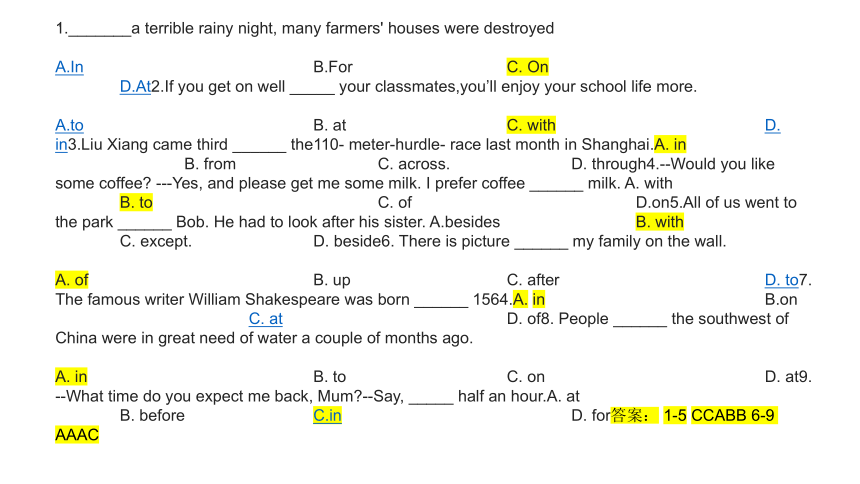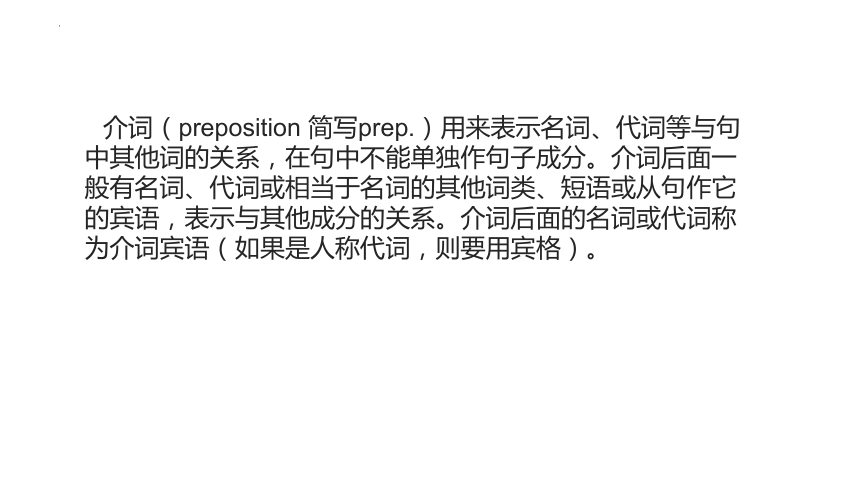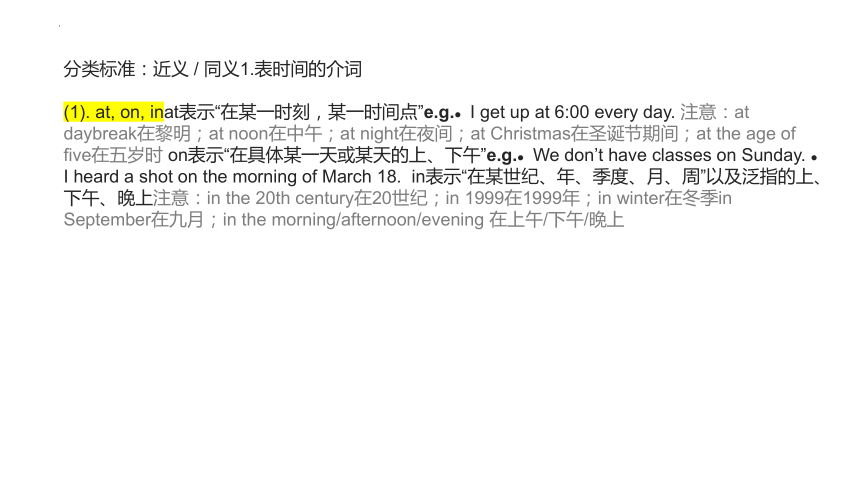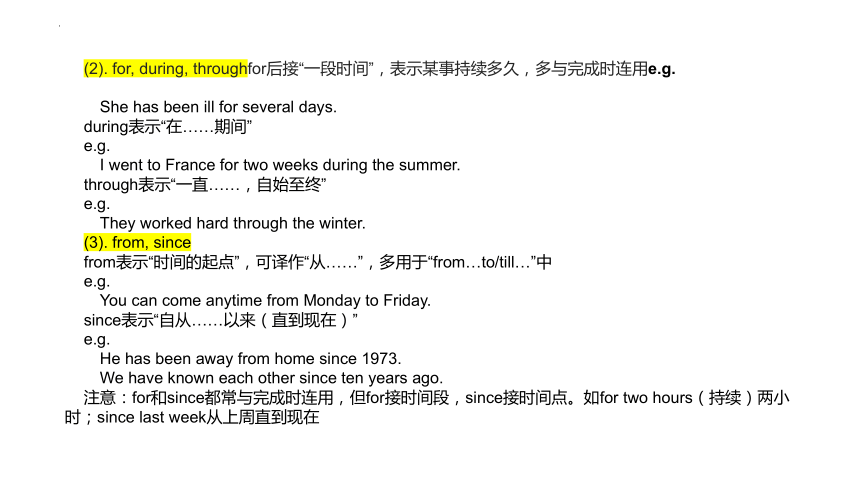2024届高考英语复习:介词课件(共22张PPT)
文档属性
| 名称 | 2024届高考英语复习:介词课件(共22张PPT) |

|
|
| 格式 | pptx | ||
| 文件大小 | 271.6KB | ||
| 资源类型 | 教案 | ||
| 版本资源 | 通用版 | ||
| 科目 | 英语 | ||
| 更新时间 | 2023-07-19 00:00:00 | ||
图片预览









文档简介
(共22张PPT)
介词
1._______a terrible rainy night, many farmers' houses were destroyed
A.In B.For C. On D.At2.If you get on well _____ your classmates,you’ll enjoy your school life more.
A.to B. at C. with D. in3.Liu Xiang came third ______ the110- meter-hurdle- race last month in Shanghai.A. in B. from C. across. D. through4.--Would you like some coffee ---Yes, and please get me some milk. I prefer coffee ______ milk. A. with B. to C. of D.on5.All of us went to the park ______ Bob. He had to look after his sister. A.besides B. with C. except. D. beside6. There is picture ______ my family on the wall.
A. of B. up C. after D. to7. The famous writer William Shakespeare was born ______ 1564.A. in B.on C. at D. of8. People ______ the southwest of China were in great need of water a couple of months ago.
A. in B. to C. on D. at9. --What time do you expect me back, Mum --Say, _____ half an hour.A. at B. before C.in D. for答案: 1-5 CCABB 6-9 AAAC
介词的定义
01
介词(preposition 简写prep.)用来表示名词、代词等与句中其他词的关系,在句中不能单独作句子成分。介词后面一般有名词、代词或相当于名词的其他词类、短语或从句作它的宾语,表示与其他成分的关系。介词后面的名词或代词称为介词宾语(如果是人称代词,则要用宾格)。
介词的分类
02
分类标准:近义 / 同义1.表时间的介词
(1). at, on, inat表示“在某一时刻,某一时间点”e.g.l I get up at 6:00 every day. 注意:at daybreak在黎明;at noon在中午;at night在夜间;at Christmas在圣诞节期间;at the age of five在五岁时 on表示“在具体某一天或某天的上、下午”e.g.l We don’t have classes on Sunday. l I heard a shot on the morning of March 18. in表示“在某世纪、年、季度、月、周”以及泛指的上、下午、晚上注意:in the 20th century在20世纪;in 1999在1999年;in winter在冬季in September在九月;in the morning/afternoon/evening 在上午/下午/晚上
(2). for, during, throughfor后接“一段时间”,表示某事持续多久,多与完成时连用e.g.
She has been ill for several days.
during表示“在……期间”
e.g.
I went to France for two weeks during the summer.
through表示“一直……,自始至终”
e.g.
They worked hard through the winter.
(3). from, since
from表示“时间的起点”,可译作“从……”,多用于“from…to/till…”中
e.g.
You can come anytime from Monday to Friday.
since表示“自从……以来(直到现在)”
e.g.
He has been away from home since 1973.
We have known each other since ten years ago.
注意:for和since都常与完成时连用,但for接时间段,since接时间点。如for two hours(持续)两小时;since last week从上周直到现在
(4). before, by, till, untilbefore指“在……之前”,与after相对e.g.l Please come before ten o’clock. by指“不迟于,到……时为止,在……以前”。e.g.l We had learned over 1000 words by the end of last term. l We will have learned 2000 English words by the end of this term.注意:by后接过去时间,常与过去完成时连用;by后接将来时间,常与将来完成时连用 till (until) “直到……为止”
e.g.
You must wait for him till tomorrow.
注意:在肯定句中,till/until必须与延续动词连用;在否定句中,till/until常与非延续性动词连用
I didn’t go to bed until 12 o’clock.
(5). after, in, withinafter表示“在……之后”,是before的反义词e.g.l He got a cancer and died after a year. l The meeting will end after 3:00pm. within“在……时间之内”e.g.l I can finish it within an hour. 注意:after与in都可表示“在……之后”,但after后可跟时间段,也可跟时间点;而in后必须跟时间段。after既可用于将来时,也可用于过去时,而in只能用于将来时e.g.I’ll arrive in an hour.
过关检测
1. The mother continued to care for the young panda ___ more than two years.
2. He invited me to a dance after the show Christmas Eve.
3.—When do we need to pay the balance
— September 30. 答案:1. for 2. on 3. on
2.表地点的介词
(1). in, outside, between, amongin表示“在……里面”e.g.l She put her book in the desk. outside表示“在……外面”e.g.l What did you see outside the hall between表示“在……之间(指二者)”e.g.l The building stands between the park and the small river. among表示“在……之间(指多者)”e.g.l “There is a thief among you. ” the policeman shouted to the crowd.
(2). on, above, over, below, under on表示“在……上面”,表面相互接触e.g.l There is a book on the desk. above表示“在……上方,位置高出……”,与below相对e.g.l The Turners live above us. over表示“在……正上方”,与under相对e.g.l The picture is hanging over the blackboard. below表示“在……下方,低于……”。
e.g.
Her skirt reaches just below her knees.
under表示“在……正下方”。
e.g.
They sat under a big tree, drinking.
(3). near, by, beside
near表示“在……附近”。e.g.l My home is near the school. by = beside, 表示“靠近,在……旁边”,比near距离更近 e.g.l He just sat by/ beside me in the cinema.
(4). in front of, behind, aroundin front of 表示“在……前面”,指在外部e.g.l There is a tall tree in front of our classroom. 比较:in the front of表示“在……前部”,指在内部e.g.There is a red chair in the front of the room. behind表示“在……后面”e.g.l A high building stands behind the village. around表示“在……周围,围绕”e.g.l There are many trees around the village.
(5). from, to, for, into, out of
from表示“从……”
e.g.
She will fly from Beijing to Hongkong.
to表示“到……”,指目的地
e.g.
They got to the town very late.
for表示“去,向……”,指方向或去向
e.g.
The train for shanghai has been away.
比较:towards仅指朝着某个方向,不一定是目的地;to指到目的地;for指向目的地,且常用于leave for; start for等固定搭配中。
into表示“进入”
e.g.
The teacher came into the classroom with a smile.
比较:into由外进入到里面,是动态的;而in是指静态的位置。
out of表示“从……出来”
e.g.
They pulled him out of the water.
比较:out of是指从里面出来,是动态的;而outside是指静态的位置。
(6). along, across, through, overalong表示“沿着”街、路、河岸等线形物e.g.l There are all kinds of beautiful flowers along the street. across表示“横穿”某一平面,或“横过”某一线形物e.g.l Pipes carry oil across the desert.
through指从某物的内部“穿过”
e.g.
It took us ten minutes to drive through the tunnel.
over指“越过”某一障碍物
e.g.
The bear went over the mountain.
(7). at, in
at指较小的地方,如车站、家等;
in多指在较大地方,如国家、城市、大洲等。
e.g.
Please wait for me at the bus station.
The plane will arrive in Beijing at 13:00.
过关检测
1.The store is located upstairs Building 3 right next to the Laster Dome. 2. Shirley, a real book lover, often brings home many books to read the library.3. Sean has formed the habit of jogging the tree-lined avenue for two hours every day. 4. Research shows that giving up driving is one of the key reasons for a fall in health and well-being older people. 答案:1. in 2. in 3. along 4. among
3.表示计量的介词at表示“以……速度”“以……价格”e.g.· It flies at about 900 kilometers an hour.
I sold my car at a high price.
for表示“用……交换,以……为代价”
e.g.
He sold his car for 500 dollars.
注意:at表示单价(price) ,for表示总钱数
by表示“以……计”,后跟度量单位
e.g.
They paid him by the month.
4.表示工具或手段的介词by用某种方式,多用于交通 如by bus乘公共汽车,by e-mail通过电子邮件注意:表示搭乘交通工具时,用by时不用冠词,用in时要用冠词比较:I went there by bus/in a bus. with表示“用某种工具” e.g.· He broke the window with a stone. 注意:with表示用某种工具时,必须用冠词或物主代词 on表示“以……方式”,多用于固定词组e.g.· They talked on the telephone.
5.表示关于的介词of仅是提到或谈到过某人或某事e.g.· He spoke of the film the other day. · He thought of this matter yesterday.
about指“关于”某人或某事物的较详细的情况
e.g.
Can you tell me something about yourself
on指“关于”学术性的或严肃的事
e.g.
It’s a textbook on the history of China.
6.表原因或理由的介词for表示原因,常与sorry, famous, punish, praise, thank, blame等词连用e.g.· I am sorry for what I said to you. at指情感变化的原因,意为“因听到或看到而……”e.g.· He was surprised at the news. because of 表示引起结果的直接原因。e.g.· He retired last month because of illness/because he was ill. thanks to表示引起某种幸运结果的原因,常译为“幸亏……,多亏……”e.g.· Thanks to John, we won the game. out of表示动机的起因,常译为“出于……”。e.g.· He asked the question out of curiosity.
7.表示好像或当作的介词like表示“像……一样”e.g.
Although I am a free man, I worked like a slave.
as表示“作为,以……身份”
e.g.
As a schoolboy, he showed every sign of genius.
8.表示支持或反对的介词
against反对
for支持,与against互为反义词
e.g.
Are you for my idea or against it
注意:against还可以用来表示靠着
Jim was fast asleep with his back against a big tree.
巩固练习
1.But my connection with pandas goes back my days on a TV show in the mid-1980s, when I was the first Western TV reporter permitted to film a special unit caring for pandas rescued from starvation in the wild. 2.Most of us are more focused our tasks in the morning than we are later in the day. 3.When a new day breaks, the walls have given up their heat and are now cold enough to cool the house during the hot day; the same time, they warm up again for the night. 4.John became a football coach in Sealion Middle School the beginning of March.5. Most people work because it's unavoidable. contrast, there are some people who actually enjoy work. 6. These comments came in response specific questions often asked by local newsmen. 7. No one helped me. I did it all myself. 8.Although my opinion, the old professor didn’t come up with his own.
答案:1. to 2. on 3. at 4. at 5. to 6. by 7. in
介词
1._______a terrible rainy night, many farmers' houses were destroyed
A.In B.For C. On D.At2.If you get on well _____ your classmates,you’ll enjoy your school life more.
A.to B. at C. with D. in3.Liu Xiang came third ______ the110- meter-hurdle- race last month in Shanghai.A. in B. from C. across. D. through4.--Would you like some coffee ---Yes, and please get me some milk. I prefer coffee ______ milk. A. with B. to C. of D.on5.All of us went to the park ______ Bob. He had to look after his sister. A.besides B. with C. except. D. beside6. There is picture ______ my family on the wall.
A. of B. up C. after D. to7. The famous writer William Shakespeare was born ______ 1564.A. in B.on C. at D. of8. People ______ the southwest of China were in great need of water a couple of months ago.
A. in B. to C. on D. at9. --What time do you expect me back, Mum --Say, _____ half an hour.A. at B. before C.in D. for答案: 1-5 CCABB 6-9 AAAC
介词的定义
01
介词(preposition 简写prep.)用来表示名词、代词等与句中其他词的关系,在句中不能单独作句子成分。介词后面一般有名词、代词或相当于名词的其他词类、短语或从句作它的宾语,表示与其他成分的关系。介词后面的名词或代词称为介词宾语(如果是人称代词,则要用宾格)。
介词的分类
02
分类标准:近义 / 同义1.表时间的介词
(1). at, on, inat表示“在某一时刻,某一时间点”e.g.l I get up at 6:00 every day. 注意:at daybreak在黎明;at noon在中午;at night在夜间;at Christmas在圣诞节期间;at the age of five在五岁时 on表示“在具体某一天或某天的上、下午”e.g.l We don’t have classes on Sunday. l I heard a shot on the morning of March 18. in表示“在某世纪、年、季度、月、周”以及泛指的上、下午、晚上注意:in the 20th century在20世纪;in 1999在1999年;in winter在冬季in September在九月;in the morning/afternoon/evening 在上午/下午/晚上
(2). for, during, throughfor后接“一段时间”,表示某事持续多久,多与完成时连用e.g.
She has been ill for several days.
during表示“在……期间”
e.g.
I went to France for two weeks during the summer.
through表示“一直……,自始至终”
e.g.
They worked hard through the winter.
(3). from, since
from表示“时间的起点”,可译作“从……”,多用于“from…to/till…”中
e.g.
You can come anytime from Monday to Friday.
since表示“自从……以来(直到现在)”
e.g.
He has been away from home since 1973.
We have known each other since ten years ago.
注意:for和since都常与完成时连用,但for接时间段,since接时间点。如for two hours(持续)两小时;since last week从上周直到现在
(4). before, by, till, untilbefore指“在……之前”,与after相对e.g.l Please come before ten o’clock. by指“不迟于,到……时为止,在……以前”。e.g.l We had learned over 1000 words by the end of last term. l We will have learned 2000 English words by the end of this term.注意:by后接过去时间,常与过去完成时连用;by后接将来时间,常与将来完成时连用 till (until) “直到……为止”
e.g.
You must wait for him till tomorrow.
注意:在肯定句中,till/until必须与延续动词连用;在否定句中,till/until常与非延续性动词连用
I didn’t go to bed until 12 o’clock.
(5). after, in, withinafter表示“在……之后”,是before的反义词e.g.l He got a cancer and died after a year. l The meeting will end after 3:00pm. within“在……时间之内”e.g.l I can finish it within an hour. 注意:after与in都可表示“在……之后”,但after后可跟时间段,也可跟时间点;而in后必须跟时间段。after既可用于将来时,也可用于过去时,而in只能用于将来时e.g.I’ll arrive in an hour.
过关检测
1. The mother continued to care for the young panda ___ more than two years.
2. He invited me to a dance after the show Christmas Eve.
3.—When do we need to pay the balance
— September 30. 答案:1. for 2. on 3. on
2.表地点的介词
(1). in, outside, between, amongin表示“在……里面”e.g.l She put her book in the desk. outside表示“在……外面”e.g.l What did you see outside the hall between表示“在……之间(指二者)”e.g.l The building stands between the park and the small river. among表示“在……之间(指多者)”e.g.l “There is a thief among you. ” the policeman shouted to the crowd.
(2). on, above, over, below, under on表示“在……上面”,表面相互接触e.g.l There is a book on the desk. above表示“在……上方,位置高出……”,与below相对e.g.l The Turners live above us. over表示“在……正上方”,与under相对e.g.l The picture is hanging over the blackboard. below表示“在……下方,低于……”。
e.g.
Her skirt reaches just below her knees.
under表示“在……正下方”。
e.g.
They sat under a big tree, drinking.
(3). near, by, beside
near表示“在……附近”。e.g.l My home is near the school. by = beside, 表示“靠近,在……旁边”,比near距离更近 e.g.l He just sat by/ beside me in the cinema.
(4). in front of, behind, aroundin front of 表示“在……前面”,指在外部e.g.l There is a tall tree in front of our classroom. 比较:in the front of表示“在……前部”,指在内部e.g.There is a red chair in the front of the room. behind表示“在……后面”e.g.l A high building stands behind the village. around表示“在……周围,围绕”e.g.l There are many trees around the village.
(5). from, to, for, into, out of
from表示“从……”
e.g.
She will fly from Beijing to Hongkong.
to表示“到……”,指目的地
e.g.
They got to the town very late.
for表示“去,向……”,指方向或去向
e.g.
The train for shanghai has been away.
比较:towards仅指朝着某个方向,不一定是目的地;to指到目的地;for指向目的地,且常用于leave for; start for等固定搭配中。
into表示“进入”
e.g.
The teacher came into the classroom with a smile.
比较:into由外进入到里面,是动态的;而in是指静态的位置。
out of表示“从……出来”
e.g.
They pulled him out of the water.
比较:out of是指从里面出来,是动态的;而outside是指静态的位置。
(6). along, across, through, overalong表示“沿着”街、路、河岸等线形物e.g.l There are all kinds of beautiful flowers along the street. across表示“横穿”某一平面,或“横过”某一线形物e.g.l Pipes carry oil across the desert.
through指从某物的内部“穿过”
e.g.
It took us ten minutes to drive through the tunnel.
over指“越过”某一障碍物
e.g.
The bear went over the mountain.
(7). at, in
at指较小的地方,如车站、家等;
in多指在较大地方,如国家、城市、大洲等。
e.g.
Please wait for me at the bus station.
The plane will arrive in Beijing at 13:00.
过关检测
1.The store is located upstairs Building 3 right next to the Laster Dome. 2. Shirley, a real book lover, often brings home many books to read the library.3. Sean has formed the habit of jogging the tree-lined avenue for two hours every day. 4. Research shows that giving up driving is one of the key reasons for a fall in health and well-being older people. 答案:1. in 2. in 3. along 4. among
3.表示计量的介词at表示“以……速度”“以……价格”e.g.· It flies at about 900 kilometers an hour.
I sold my car at a high price.
for表示“用……交换,以……为代价”
e.g.
He sold his car for 500 dollars.
注意:at表示单价(price) ,for表示总钱数
by表示“以……计”,后跟度量单位
e.g.
They paid him by the month.
4.表示工具或手段的介词by用某种方式,多用于交通 如by bus乘公共汽车,by e-mail通过电子邮件注意:表示搭乘交通工具时,用by时不用冠词,用in时要用冠词比较:I went there by bus/in a bus. with表示“用某种工具” e.g.· He broke the window with a stone. 注意:with表示用某种工具时,必须用冠词或物主代词 on表示“以……方式”,多用于固定词组e.g.· They talked on the telephone.
5.表示关于的介词of仅是提到或谈到过某人或某事e.g.· He spoke of the film the other day. · He thought of this matter yesterday.
about指“关于”某人或某事物的较详细的情况
e.g.
Can you tell me something about yourself
on指“关于”学术性的或严肃的事
e.g.
It’s a textbook on the history of China.
6.表原因或理由的介词for表示原因,常与sorry, famous, punish, praise, thank, blame等词连用e.g.· I am sorry for what I said to you. at指情感变化的原因,意为“因听到或看到而……”e.g.· He was surprised at the news. because of 表示引起结果的直接原因。e.g.· He retired last month because of illness/because he was ill. thanks to表示引起某种幸运结果的原因,常译为“幸亏……,多亏……”e.g.· Thanks to John, we won the game. out of表示动机的起因,常译为“出于……”。e.g.· He asked the question out of curiosity.
7.表示好像或当作的介词like表示“像……一样”e.g.
Although I am a free man, I worked like a slave.
as表示“作为,以……身份”
e.g.
As a schoolboy, he showed every sign of genius.
8.表示支持或反对的介词
against反对
for支持,与against互为反义词
e.g.
Are you for my idea or against it
注意:against还可以用来表示靠着
Jim was fast asleep with his back against a big tree.
巩固练习
1.But my connection with pandas goes back my days on a TV show in the mid-1980s, when I was the first Western TV reporter permitted to film a special unit caring for pandas rescued from starvation in the wild. 2.Most of us are more focused our tasks in the morning than we are later in the day. 3.When a new day breaks, the walls have given up their heat and are now cold enough to cool the house during the hot day; the same time, they warm up again for the night. 4.John became a football coach in Sealion Middle School the beginning of March.5. Most people work because it's unavoidable. contrast, there are some people who actually enjoy work. 6. These comments came in response specific questions often asked by local newsmen. 7. No one helped me. I did it all myself. 8.Although my opinion, the old professor didn’t come up with his own.
答案:1. to 2. on 3. at 4. at 5. to 6. by 7. in
